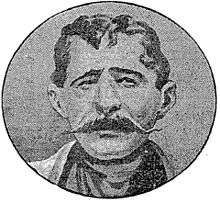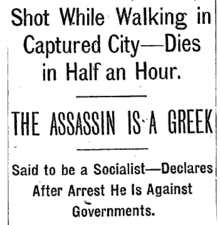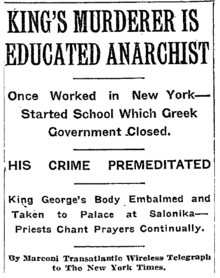Alexandros Schinas

Alexandros Schinas (Greek: Αλέξανδρος Σχινάς) (1870 in Volos – May 6, 1913 in Thessaloniki), was a Greek[1] anarchist who assassinated King George I of Greece in Thessaloniki in 1913.
Schinas had worked in the pantry of the Fifth Avenue Hotel in New York City (it closed in 1908) and a waiter remembered him as an avid reader of socialism-related literature and spending nights in Manhattan "making friends with radical and fervid thinkers".[2] Schinas was against governments and especially against aristocracy and monarchy.

He started an anarchist school in his native town which the Greek government closed for spreading anti-government ideas. Two of the leaders of the school were sentenced to prison, but Schinas escaped without being imprisoned. The authorities also seized a number of books and pamphlets published by the school, which were deemed to contain anarchist doctrine and denounced the king.[3]
On March 18, 1913, at around 5:15 PM,[1] Schinas (who was around 40 at the time) shot King George I in the back from a distance of two paces while the king was walking in Thessaloniki near the White Tower. Entering below the king's shoulder blade, the bullet pierced his heart and lungs and exited through his stomach. By the time the king arrived at the hospital, he was already dead.[4]

Schinas was taken into custody immediately, initially refusing to explain the reason for the crime, but when asked by an officer whether he had no "pity" for his country, he answered he was against governments.[4] As Schinas remained calm for the entire event, there were suggestions that he was not "responsible for his actions".[4] Later, Schinas declared that he killed the king because the latter refused to give him the money he asked for.[5] The Greek government released statements claiming that Schinas was an alcoholic vagrant.[6]
Schinas was tortured throughout the following night, being "forced to undergo examinations", but he refused to give the names of any accomplices.[7] On May 6, he died by allegedly jumping out of the window of the gendarmerie in Thessaloniki, a fall that was reported as a suicide.[8]
Various theories on the motives of Schinas circulated later, including that his action was directed by Bulgaria as a form of revenge for its lost territories, Austria-Hungary for political reasons or Germany for dynastic reasons; however, there is no evidence for any of them.[9]
See also
References
- 1 2 King of Greece Murdered at Salonika; Slayer Mad; Political Results Feared By Marconi Transatlantic Wireless Telegraph New York Times March 19, 1913; pg. 1
- ↑ The Assassin Lived Here. Special to The New York Times. New York Times; March 20, 1913; pg. 3
- ↑ King's Murderer Is Educated Anarchist, by Marconi Transatlantic Wireless Telegraph; New York Times; March 20, 1913; pg. 3
- 1 2 3 Died Before Reaching Hospital. New York Times; March 19, 1913; pg. 1
- ↑ Sorrow Throughout Greece, by Marconi Transatlantic Wireless Telegraph; New York Times; March 19, 1913; pg. 2
- ↑ The Times (London); 20 March 1913; pg. 6
- ↑ New York Times; March 20, 1913; pg. 3
- ↑ King's Slayer A Suicide. New York Times; May 7, 1913; pg. 3
- ↑ Why Powers Forced Kings on Greece, by Walter Littlefield. New York Times, March 16, 1924; pg. E7